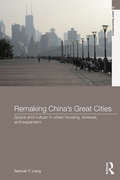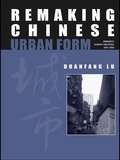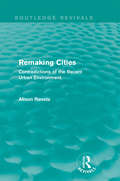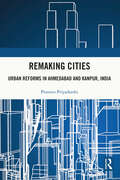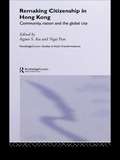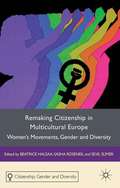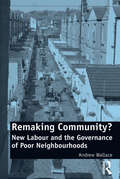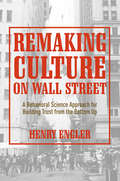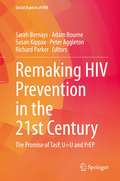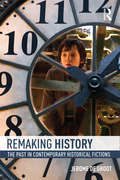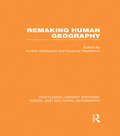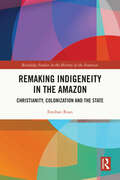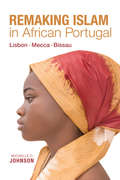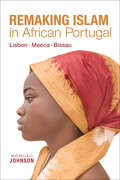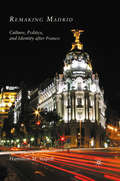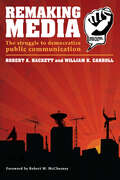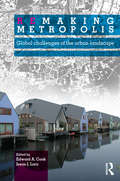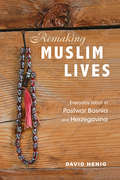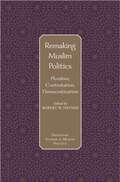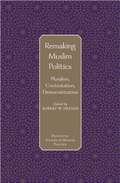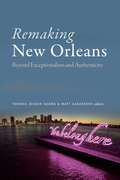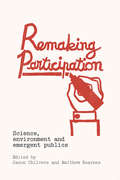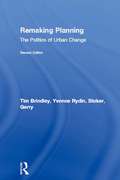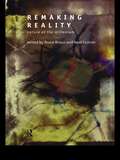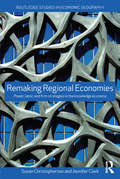- Table View
- List View
Remaking China's Great Cities: Space and Culture in Urban Housing, Renewal, and Expansion (Asia's Transformations)
by Samuel Y. LiangChina’s rapid urbanization has restructured the great socialist cities Beijing, Shanghai, and Guangzhou into mega cities that embrace global capitalism. This book focuses on the urban transformations of these three cities: Beijing is the nation’s political and cultural capital; Shanghai is the economic and financial powerhouse; and Guangzhou is the capital of Guangdong Province and the regional center of south China. All are historical cities with rich imperial, colonial, and regional heritages, and all have been drastically transformed in the last six decades. This book examines the cities’ continuous urban legacies since 1949 in relation to state governance, economic reforms, and cultural production. By adopting local historical perspectives, it offers more nuanced accounts of the current urban change than the modernization/globalization paradigm and conceptualizes the change in the context of the cities’ socialist, colonial, and imperial legacies. Specifically, Samuel Y. Liang offers an overview of the urban planning and territorial expansion of the great cities since 1949; explores the production and consumption of urban housing, its spatial forms, media representations, and socio-political implications; and examines the state-led redevelopment of old urban cores and residential neighborhoods, and the urban conservation movement. Remaking China’s Great Cities will be of great interest to students and scholars working across a range of fields including Chinese studies, Chinese culture and society, urban studies and architecture.
Remaking Chinese Urban Form: Modernity, Scarcity and Space, 1949-2005 (Planning, History and Environment Series)
by Duanfang LuIn this pioneering study of contemporary Chinese urban form, Duanfang Lu provides an analysis of how Chinese society constructed itself through the making and remaking of its built environment. She shows that as China’s quest for modernity created a perpetual scarcity as both a social reality and a national imagination, the realization of planning ideals was postponed. The work unit – the socialist enterprise or institute – gradually developed from workplace to social institution which integrated work, housing and social services. The Chinese city achieved a unique geography made up in large part of self-contained work units. Remaking Chinese Urban Form provides an important reference for academics and students conducting research on China. It will be a key source for courses on Asia in architecture, urban planning, geography, sociology and anthropology, at both the graduate and undergraduate level. The insightful yet accessible introduction to urban China will also be of interest to architects, urban designers and planners – as well as general audience who wish to learn about contemporary Chinese society.
Remaking Cities: Contradictions of the Recent Urban Environment (Routledge Revivals)
by Alison RavetzThis book, published in 1980, is an iconoclastic account of one of the pillars of the welfare state, British town and country planning, between 1945 and 1975. Always a fine balance between central control and market forces, it was challenged by strains within and between the environmental professions and protest by people dispossessed or alienated by re-shaped urban environments. Remaking Cities critiques the export of western-style planning to the developing world and reviews initiatives rooted in different understandings of ‘growth’ appearing in those years. Nearly forty years on, many of the same issues beset us, notably the depressingly familiar inner city problem, despite countless reports, funds and ‘programmes’. But now our infrastructure and services, once publicly owned, are privatised and fragmented, and local government progressively relegated. The very core of planning, development control, is being pared in a struggle to regain the ‘growth’ which led to our current crisis. This gives fresh importance to the need for new modes of creating liveable, sustainable environments, emphasised in this important work.
Remaking Cities: Urban Reforms in Ahmedabad and Kanpur, India
by Praveen PriyadarshiThis book presents a systematic analysis of the differential implementation of the urban reforms in two Indian cities, Ahmedabad and Kanpur. It analyses the enactment of the Jawaharlal Nehru National Urban Renewal Mission (JNNURM), launched in 2005 by the Indian government, which aimed to spatially reorient cities into market-friendly places across 65 sites across the country but finished with only modest success. The volume discusses the specificities of urban governance systems, municipal history of a colonial city, and nationalist struggle in relation to urban planning and policy reforms to showcase how policies insensitive to these are likely to fail. It identifies historically constituted municipal capacity — located in the municipal organization at the city level — as the key determinant of divergent trajectories of the spatial changes. The analysis demonstrates that in Ahmedabad, the politics of the city was historically oriented towards peoples’ relationship with their spaces, enabling a coherent municipal organisation. In the case of Kanpur however, the local politics evolved in a way that the urban question remained unresolved, which resulted in a fragmented municipal organisation. This variation in the architectures of municipal organisations in the two cities therefore resulted in different levels of municipal capacities at the time of the inauguration of the JNNURM. A richly detailed case study on urban governance issues and development in Indian cities, this book will be an essential read for scholars and researchers of urban studies, urban politics, development studies, social anthropology, social history, political science, development studies, public policy and governance, urban sociology, and South Asian studies.
Remaking Citizenship in Hong Kong: Community, Nation and the Global City (Routledge Studies in Asia's Transformations #6)
by Ngai Pun Agnes S. KuThis book provides a detailed comparative account of the development of citizenship and civil society in Hong Kong from its time as a British colony to its current status as a special autonomous region of China.
Remaking Citizenship in Multicultural Europe
by Sasha Roseneil Beatrice Halsaa Sevil SümerThis book offers a ground-breaking analysis of how women's movements have been remaking citizenship in multicultural Europe. Presenting the findings of a large scale, multi-disciplinary cross-national feminist research project, FEMCIT, it develops an expanded, multi-dimensional understanding of citizenship as practice and experience.
Remaking Community?: New Labour and the Governance of Poor Neighbourhoods
by Andrew WallaceNew Labour deployed community as a conceptual framework to rearticulate the state / citizen relationship to be enacted at and through new spaces of governance. An important example of this was how successive New Labour governments sought to renovate the social, political and economic cultures of poor neighbourhoods and generate trajectories of strong, empowered and ordered civic space. This was pursued through programmes such as the New Deal for Communities (NDC) that sought to invigorate and embed socially excluded citizens within localised regeneration projects. In attempting to construct community as a space through which personal and spatial renewal could be achieved, New Labour relied on problematic assumptions about the nature, scope and meaning of community and its relationship with individual social agents. Drawing on original research conducted in an NDC neighbourhood, Remaking Community addresses the interlinking uses of community in government rhetoric and practice. It explores why this concept was so central to the New Labour governing project and what it meant for individuals enveloped in the 'regeneration' of their citizenship and locality. It seeks to understand how community is conceptualised, applied, constructed, misunderstood, exploited, experienced, contested, mobilised and activated by both policy actors and neighbourhood residents and situates this discussion within an examination of the political, emotional and cultural impact of the regeneration experience. Offering a timely analysis of New Labour, regeneration and the politics of community, this book makes an original and important contribution to debates around new spaces of governance, citizen participation and the tackling social exclusion in poor neighbourhoods.
Remaking Culture on Wall Street: A Behavioral Science Approach for Building Trust from the Bottom Up
by Henry EnglerSince 2008, financial firms have paid, in aggregate, in excess of $320 billion in fines related to misconduct. Nearly ten years later, while many large financial firms have increased their attention to bad behavior and cultural drivers, the degree of commitment and progress in these efforts has not been even across the industry. Serious or persistent misconduct continues in some firms. Many organizations have attempted to curb bad behavior through intrusive monitoring and enforcement actions which reflect a lack of trust in their employees. A different approach is needed, one that gets at the root causes of misconduct and attempts to rebuild culture from the bottom up, with the employee at the center. This is where tools from behavioral science can help senior risk officers, compliance and business heads better understand the mind-set of their employees and internal communities and create an environment where the link between ethical behavior and strong business results is promoted. If firms continue to fail in establishing stronger internal cultures, regulators may feel compelled to step in and dictate what they should do. This book emphasizes the need for a change in approach, looking at the increased incidence of misconduct and culture breakdown since the 2008 crisis, how regulators have responded, and includes a series of proposals to restore that trust and reform culture.
Remaking HIV Prevention in the 21st Century: The Promise of TasP, U=U and PrEP (Social Aspects of HIV #5)
by Richard Parker Peter Aggleton Susan Kippax Sarah Bernays Adam BourneThis edited collection brings together the social dimensions of three key aspects of recent biomedical advance in HIV research: Treatment as Prevention (TasP), new technologies such as Pre-Exposure Prophylaxis (PrEP), and the Undetectable equals Untransmittable (U=U) movement. The growth of new forms of biomedical HIV prevention has created hope for the future, signalling the possibility of a world without AIDS. In this context, the volume discusses the profound social, political and ethical dilemmas raised by such advances, which are to do with readiness, access, equity and availability. It examines how HIV prevention has been, and is, re-framed in policy, practice and research, and asks: How best can new biomedical technologies be made available in a profoundly unequal world? What new understandings of responsibility and risk will emerge as HIV becomes a more manageable condition? What new forms of blame will emerge in a context where the technologies to prevent HIV exist, but are not always used? How best can we balance public health’s concern for adherence and compliance with the rights of individuals to decide on what is best for themselves and others? Few of these questions have thus far received serious consideration in the academic literature.The editors, all leaders in the social aspects of HIV, have brought together an innovative and international collection of essays by top thinkers and practitioners in the field of HIV. This book is an important resource for academics and professionals interested in HIV research.Chapters "Anticipating Policy, Orienting Services, Celebrating Provision: Reflecting on Scotland’s PrEP Journey", "How the science of HIV treatment-as-prevention restructured PEPFAR’s strategy: The case for scaling up ART in ‘epidemic control’ countries", "Stigma and confidentiality indiscretions: Intersecting obstacles to the delivery of Pre-Exposure Prophylaxis to adolescent girls and young women in east Zimbabwe" and "The drive to take an HIV test in rural Uganda: a risk to prevention for young people?" are available open access under a Creative Commons Attribution 4.0 International License via link.springer.com.
Remaking History: The Past in Contemporary Historical Fictions
by Jerome De GrootRemaking History considers the ways that historical fictions of all kinds enable a complex engagement with the past. Popular historical texts including films, television and novels, along with cultural phenomena such as superheroes and vampires, broker relationships to ‘history’, while also enabling audiences to understand the ways in which the past is written, structured and ordered. Jerome de Groot uses examples from contemporary popular culture to show the relationship between fiction and history in two key ways. Firstly, the texts pedagogically contribute to the historical imaginary and secondly they allow reflection upon how the past is constructed as ‘history’. In doing so, they provide an accessible and engaging means to critique, conceptualize and reject the processes of historical representation. The book looks at the use of the past in fiction from sources including Mad Men, Downton Abbey and Howard Brenton’s Anne Boleyn, along with the work of directors such as Terence Malick, Quentin Tarantino and Martin Scorsese, to show that fictional representations enable a comprehension of the fundamental strangeness of the past and the ways in which this foreign, exotic other is constructed. Drawing from popular films, novels and TV series of recent years, and engaging with key thinkers from Marx to Derrida, Remaking History is a must for all students interested in the meaning that history has for fiction, and vice versa.
Remaking Human Geography: Social And Cultural Geography: Remaking Human Geography (Routledge Library Editions: Social and Cultural Geography)
by Audrey Kobayashi Suzanne MackenzieThis book highlights the increasingly important contribution of geographical theory to the understanding of social change, values, economic & political organization and ethical imperatives. As a cohesive collection of chapters from well-known geographers in Britain and North America, it reflects the aims of the contributors in striving to bridge the gap between the historical-materialist and humanist interpretations of human geography. The book deals with both the contemporary issues outlined above and the situation in which they emerge: industrial restructuring, planning, women’s issues, social and cultural practices and the landscape as context for social action.
Remaking Indigeneity in the Amazon: Christianity, Colonization and the State
by Esteban RozoDrawing on archival and ethnographic work, this book analyses how indigeneity, Christianity, and state-making became intertwined in the Colombian Amazon throughout the 20th century. At the end of the 19th century the state gave Catholic missionaries tutelage over Indigenous groups and their territories, but, in the case of the Colombian Amazon, this tutelage was challenged by evangelical missionaries that arrived in the region in the 1940s with different ideas of civilization and social change. Indigenous conversion to evangelical Christianity caused frictions with other actors, while Indigenous groups perceived conversion to evangelical Christianity as way of leverage with settlers. This book shows how evangelical Christianity shaped new forms of indigeneity that did not coincide entirely with the ideas of civilization or development that Catholic missionaries and the state promoted in the region. Since the 1960s, the state adapted development policies and programs to Indigenous realities and practices, while Indigenous societies appropriated evangelical Christianity in order to navigate the changes brought on by colonization and state-formation. This study demonstrates that not all projects of civilization were the same in Amazonia, nor was missionization of Indigenous groups always subordinate to the state or resource extraction.
Remaking Islam in African Portugal: Lisbon—Mecca—Bissau (Framing the Global)
by Michelle JohnsonWhen Guinean Muslims leave their homeland, they encounter radically new versions of Islam and new approaches to religion more generally. In Remaking Islam in African Portugal, Michelle C. Johnson explores the religious lives of these migrants in the context of diaspora. Since Islam arrived in West Africa centuries ago, Muslims in this region have long conflated ethnicity and Islam, such that to be Mandinga or Fula is also to be Muslim. But as they increasingly encounter Muslims not from Africa, as well as other ways of being Muslim, they must question and revise their understanding of "proper" Muslim belief and practice. Many men, in particular, begin to separate African custom from global Islam. Johnson maintains that this cultural intersection is highly gendered as she shows how Guinean Muslim men in Lisbon—especially those who can read Arabic, have made the pilgrimage to Mecca, and attend Friday prayer at Lisbon's central mosque—aspire to be cosmopolitan Muslims. By contrast, Guinean women—many of whom never studied the Qur'an, do not read Arabic, and feel excluded from the mosque—remain more comfortably rooted in African custom. In response, these women have created a "culture club" as an alternative Muslim space where they can celebrate life course rituals and Muslim holidays on their own terms. Remaking Islam in African Portugal highlights what being Muslim means in urban Europe and how Guinean migrants' relationships to their ritual practices must change as they remake themselves and their religion.
Remaking Islam in African Portugal: Lisbon‚ Mecca‚ Bissau (Framing the Global)
by Michelle C. JohnsonA portrait of Muslim migrants adapting to a new world and a new understanding of their own religious and cultural identity in a European city.When Guinean Muslims leave their homeland, they encounter radically new versions of Islam and new approaches to religion more generally. In Remaking Islam in African Portugal, Michelle C. Johnson explores the religious lives of these migrants in the context of diaspora.Since Islam arrived in West Africa centuries ago, Muslims in this region have long conflated ethnicity and Islam, such that to be Mandinga or Fula is also to be Muslim. But as they increasingly encounter Muslims not from Africa, as well as other ways of being Muslim, they must question and revise their understanding of “proper” Muslim belief and practice. Many men, in particular, begin to separate African custom from global Islam. Johnson maintains that this cultural intersection is highly gendered as she shows how Guinean Muslim men in Lisbon—especially those who can read Arabic, have made the pilgrimage to Mecca, and attend Friday prayer at Lisbon’s central mosque—aspire to be cosmopolitan Muslims. By contrast, Guinean women—many of whom never studied the Qur’an, do not read Arabic, and feel excluded from the mosque—remain more comfortably rooted in African custom. In response, these women have created a “culture club” as an alternative Muslim space where they can celebrate life course rituals and Muslim holidays on their own terms.Remaking Islam in African Portugal highlights what being Muslim means in urban Europe, and how Guinean migrants’ relationships to their ritual practices must change as they remake themselves and their religion.
Remaking Madrid
by Hamilton M. StapellThe first full-length study of Madrid's transformation from the dreary home of a former dictatorship to a modern and vibrant city.
Remaking Media: The Struggle to Democratize Public Communication (Communication and Society)
by William Carroll Robert HackettRemaking Media is a unique and timely reading of the contemporary struggle to democratize communication. With a focus on activism directed towards challenging and changing media content, practices and structures, the book explores the burning question: What is the political significance and potential of democratic media activism in the western world today? Taking an innovative approach, Robert Hackett and William Carroll pay attention to an emerging social movement that appears at the cutting edge of cultural and political contention, and ground their work in three scholarly traditions that provide interpretive resources for the study of democratic media activism: political theories of democracy critical media scholarship the sociology of social movements. Remaking Media examines the democratization of the media and the efforts to transform the machinery of representation. Such an examination will prove invaluable not only to media and communication studies students, but also to students of political science.
Remaking Metropolis: Global Challenges of the Urban Landscape
by Edward A. Cook Jesus J. LaraRemaking Metropolis examines examples of both urban decay and destruction as well as urban rebirth. It shows why particular approaches were successful, or did not achieve their objectives. By bringing together innovative approaches to urban living from across the world, and by demonstrating how local initiatives can contribute to global solutions, the book establishes a framework in which to evaluate current and future developments for urban change, and to stimulate a reassessment of urban redevelopment and policies. "Think Globally, Act Locally" is an oft used phrase to encourage citizens to take steps close to home as part of addressing overarching environmental issues. Critics of this view point to the potential for parochial or even myopic approaches, while supporters argue that it creates both a more sustainable and a more culturally grounded environment. Remaking Metropolis brings together real world experiences that combine local action with a global world view, to demonstrate the continuum between the local and the remote. At the same time the compartmentalization of contemporary perspectives towards human life in the fields of science, design, ecology, medicine, and politics is leading to increased fragmentation of the mind, body, city, and globe. By bridging these artificial divides between disciplines, this collection of individual case studies demonstrates the holistic approach necessary for a genuinely sustainable urban condition.
Remaking Muslim Lives: Everyday Islam in Postwar Bosnia and Herzegovina (Interp Culture New Millennium #63)
by David HenigThe violent disintegration of Yugoslavia and the cultural and economic dispossession caused by the collapse of socialism continue to force Muslims in Bosnia and Herzegovina to reconfigure their religious lives and societal values. David Henig draws on a decade of fieldwork to examine the historical, social, and emotional labor undertaken by people to live in an unfinished past--and how doing so shapes the present. In particular, Henig questions how contemporary religious imagination, experience, and practice infuse and interact with social forms like family and neighborhood and with the legacies of past ruptures and critical events. His observations and analysis go to the heart of how societal and historical entanglements shape, fracture, and reconfigure religious convictions and conduct. Provocative and laden with eyewitness detail, Remaking Muslim Lives offers a rare sustained look at what it means to be Muslim and live a Muslim life in contemporary Bosnia and Herzegovina.
Remaking Muslim Politics: Pluralism, Contestation, Democratization (Princeton Studies in Muslim Politics #15)
by Robert W. HefnerThere is a struggle for the hearts and minds of Muslims unfolding across the Islamic world. The conflict pits Muslims who support pluralism and democracy against others who insist such institutions are antithetical to Islam. With some 1.3 billion people worldwide professing Islam, the outcome of this contest is sure to be one of the defining political events of the twenty-first century. Bringing together twelve engaging essays by leading specialists focusing on individual countries, this pioneering book examines the social origins of civil-democratic Islam, its long-term prospects, its implications for the West, and its lessons for our understanding of religion and politics in modern times. Although depicted by its opponents as the product of political ideas "made in the West" civil-democratic Islam represents an indigenous politics that seeks to build a distinctive Islamic modernity. In countries like Turkey, Iran, Malaysia, and Indonesia, it has become a major political force. Elsewhere its influence is apparent in efforts to devise Islamic grounds for women's rights, religious tolerance, and democratic citizenship. Everywhere it has generated fierce resistance from religious conservatives. Examining this high-stakes clash, Remaking Muslim Politics breaks new ground in the comparative study of Islam and democracy. The contributors are Bahman Baktiari, Thomas Barfield, John R. Bowen, Dale F. Eickelman, Robert W. Hefner, Peter Mandaville, Augustus Richard Norton, Gwenn Okruhlik, Michael G. Peletz, Diane Singerman, Jenny B. White, and Muhammad Qasim Zaman.
Remaking Muslim Politics: Pluralism, Contestation, and Democratization
by Robert W. HefnerThere is a struggle for the hearts and minds of Muslims unfolding across the Islamic world. The conflict pits Muslims who support pluralism and democracy against others who insist such institutions are antithetical to Islam. With some 1.3 billion people worldwide professing Islam, the outcome of this contest is sure to be one of the defining political events of the twenty-first century. Bringing together twelve engaging essays by leading specialists focusing on individual countries, this pioneering book examines the social origins of civil-democratic Islam, its long-term prospects, its implications for the West, and its lessons for our understanding of religion and politics in modern times. Although depicted by its opponents as the product of political ideas "made in the West" civil-democratic Islam represents an indigenous politics that seeks to build a distinctive Islamic modernity. In countries like Turkey, Iran, Malaysia, and Indonesia, it has become a major political force. Elsewhere its influence is apparent in efforts to devise Islamic grounds for women's rights, religious tolerance, and democratic citizenship. Everywhere it has generated fierce resistance from religious conservatives. Examining this high-stakes clash, Remaking Muslim Politics breaks new ground in the comparative study of Islam and democracy. The contributors are Bahman Baktiari, Thomas Barfield, John R. Bowen, Dale F. Eickelman, Robert W. Hefner, Peter Mandaville, Augustus Richard Norton, Gwenn Okruhlik, Michael G. Peletz, Diane Singerman, Jenny B. White, and Muhammad Qasim Zaman.
Remaking New Orleans: Beyond Exceptionalism and Authenticity
by Matt Sakakeeny Thomas Jessen AdamsApproached as a wellspring of cultural authenticity and historical exceptionality, New Orleans appears in opposition to a nation perpetually driven by progress. Remaking New Orleans shows how this narrative is rooted in a romantic cultural tradition, continuously repackaged through the twin engines of tourism and economic development, and supported by research that has isolated the city from comparison and left unquestioned its entrenched inequality. Working against this feedback loop, the contributors place New Orleans at the forefront of national patterns of urban planning, place-branding, structural inequality, and racialization. Nontraditional sites like professional wrestling matches, middle-class black suburbs, and Vietnamese gardens take precedence over clichéd renderings of Creole cuisine, voodoo queens, and hot jazz. Covering the city's founding through its present and highlighting changing political and social formations, this volume remakes New Orleans as a rich site for understanding the quintessential concerns of American cities. Contributors. Thomas Jessen Adams, Vincanne Adams, Vern Baxter, Maria Celeste Casati Allegretti, Shannon Lee Dawdy, Rien Fertel, Megan French-Marcelin, Cedric G. Johnson, Alecia P. Long, Vicki Mayer, Toby Miller, Sue Mobley, Marguerite Nguyen, Aaron Nyerges, Adolph Reed Jr., Helen A. Regis, Matt Sakakeeny, Heidi Schmalbach, Felipe Smith, Bryan Wagner
Remaking Participation: Science, Environment and Emergent Publics
by Matthew Kearnes Jason ChilversChanging relations between science and democracy – and controversies over issues such as climate change, energy transitions, genetically modified organisms and smart technologies – have led to a rapid rise in new forms of public participation and citizen engagement. While most existing approaches adopt fixed meanings of ‘participation’ and are consumed by questions of method or critiquing the possible limits of democratic engagement, this book offers new insights that rethink public engagements with science, innovation and environmental issues as diverse, emergent and in the making. Bringing together leading scholars on science and democracy, working between science and technology studies, political theory, geography, sociology and anthropology, the volume develops relational and co-productionist approaches to studying and intervening in spaces of participation. New empirical insights into the making, construction, circulation and effects of participation across cultures are illustrated through examples ranging from climate change and energy to nanotechnology and mundane technologies, from institutionalised deliberative processes to citizen-led innovation and activism, and from the global north to global south. This new way of seeing participation in science and democracy opens up alternative paths for reconfiguring and remaking participation in more experimental, reflexive, anticipatory and responsible ways. This ground-breaking book is essential reading for scholars and students of participation across the critical social sciences and beyond, as well as those seeking to build more transformative participatory practices.
Remaking Planning: The Politics of Urban Change
by Gerry Stoker Yvonne Rydin Tim BrindleyRemaking Planning challenges the common misconception that planning under the Conservative government has been dismantled and abandoned to market forces. This new edition of a very well received text brings the original study up to date with an analysis of how planning in the 1990s has responded to continuing economic restructuring, political fragmentation and social change, and developed a new awareness of uncertainty and risk. The book illustrates how planning remains as a never-ending attempt to reconcile the demands of economic efficiency with those of democratic legitimacy.
Remaking Reality: Nature at the Millenium
by Noel Castree Bruce BraunThis book rejects apocalyptic pronouncements that the end of the millenium represents the 'end' of nature as well. Remaking Reality brings together contributors from across the human sciences who argue that a notion of 'social nature' provides great hope for the future. Applying a variety of theoretical approaches to social nature, and engaging with debates in politics, science, technology and social movements surrouding race, gender and class, the contributors explroe important and emerging sites where nature is now being remade with considerable social and ecological consequences. The essays are organised around two themes: 'capitalising and envisioning nature' and 'actors, networks and the politics of hybridity'. An afterword by Neil Smith reflects on the problems and possibilities of future names.For critics and activists alike, Remaking Reality provides essential theoretical and political tools to rethink environmentalism and progressive social natures for the twenty first century.
Remaking Regional Economies: Power, Labor and Firm Strategies (Routledge Studies In Economic Geography Ser.)
by Jennifer Clark Susan ChristophersonWinner of the 2009 Regional Studies Association Best Book Award! Since the early 1980s, the region has been central to thinking about the emerging character of the global economy. In fields as diverse as business management, industrial relations, economic geography, sociology, and planning, the regional scale has emerged as an organizing concept for interpretations of economic change. This book is both a critique of the "new regionalism" and a return to the "regional question," including all of its concerns with equity and uneven development. It will challenge researchers and students to consider the region as a central scale of action in the global economy, and at the core of the book are case studies of two industries that rely on skilled, innovative, and flexible workers - the optics and imaging industry and the film and television industry. Combined with this is a discussion of the regions that constitute their production centers. The authors’ intensive research on photonics and entertainment media firms, both large and small, leads them to question some basic assumptions behind the new regionalism and to develop an alternative framework for understanding regional economic development policy. Finally, there is a re-examination of what the regional question means for the concept of the learning region.This book draws on the rich contemporary literature on the region but also addresses theoretical questions that preceded "the new regionalism." It will contribute to teaching and research in a range of social science disciplines and this new paperback edition will also make the book more accessible to students and researchers in those disciplines, those individuals who will influence the re-structuring economies of the 21st century.
